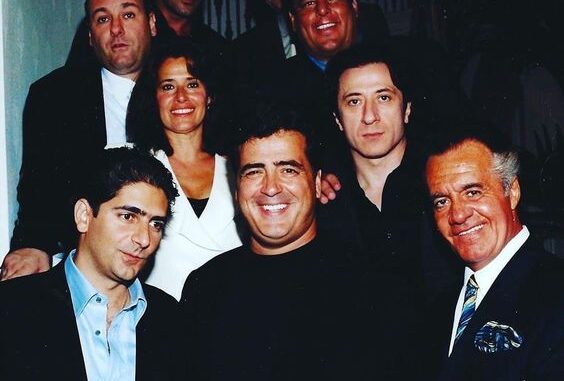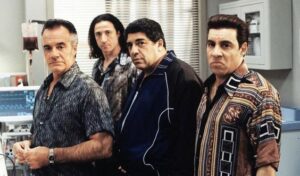
Introduction: The Birth of a TV Revolution – David Chase and Tony Soprano
David Chase, the mastermind behind The Sopranos, created a show that forever altered the landscape of television. Premiering in 1999, The Sopranos didn’t just break the mold; it reshaped the entire medium of TV. This wasn’t just another mob story—this was a revolutionary piece of television, combining complex character development, psychological depth, and moral ambiguity. At the center of it all was Tony Soprano, portrayed by the legendary James Gandolfini, a character so nuanced that it forever changed how TV audiences viewed antiheroes. So, what made The Sopranos such a groundbreaking series? How did Tony Soprano impact television as a whole?
Let’s explore the evolution of The Sopranos and the cultural shift it sparked.
The Creative Genius of David Chase: A Visionary Behind the Camera
David Chase’s ability to craft an intricate narrative is what made The Sopranos stand out. Before this show, TV drama was primarily formulaic, and characters were often one-dimensional. Chase, however, brought a cinematic quality to the small screen. He infused the mob genre with new life, portraying Tony Soprano not just as a gangster but as a deeply flawed, emotionally complex man.

Chase’s Ambitious Storytelling: Breaking the Mold
While many crime dramas focused on the glorification of mob life, The Sopranos painted a more realistic and often bleak picture. Chase’s willingness to delve into psychological territory set the show apart. Rather than focusing solely on violent confrontations, he explored Tony’s struggles with anxiety, depression, and family issues, which made his character relatable despite his criminal activities.
Tony Soprano: The Antihero Who Redefined TV Characters
Before Tony Soprano, most TV protagonists were either straightforward heroes or villains. But Chase turned this concept on its head by making Tony a deeply flawed antihero, one who audiences could both love and hate. This duality was something new for TV viewers, and it opened the door for similar characters in future shows like Breaking Bad and Mad Men.
The Complexity of Tony Soprano: A Man Torn Between Worlds
Tony wasn’t just a mob boss. He was a family man, struggling to maintain his authority in the criminal world while managing the complexities of family life. His relationship with his wife, Carmela, his children, and his therapist, Dr. Melfi, were integral parts of the show. Viewers could relate to his struggles with work-life balance, while also grappling with his violent, morally ambiguous actions.
How The Sopranos Changed the TV Landscape
The Sopranos set a new standard for what TV could achieve. It broke away from traditional sitcom formats and instead embraced longer, more layered storylines. The show’s success demonstrated that TV could offer the same level of quality and depth as film.
Raising the Bar for TV Drama
The Sopranos opened the door for the so-called “Golden Age of Television,” which saw the rise of critically acclaimed shows like The Wire, Mad Men, and Breaking Bad. This new era of television allowed writers and directors to explore more nuanced, complex storytelling, elevating TV to a form of high art.
Psychological Depth: The Importance of Therapy in The Sopranos
One of the most unique aspects of The Sopranos was its portrayal of therapy. Tony’s sessions with Dr. Melfi were not only central to his character development but also served as a critical tool for the show’s deeper exploration of psychological themes. These therapy scenes allowed audiences to see Tony’s vulnerabilities, making him a much more complex character than a typical mob boss.
The Role of Dr. Melfi: A Counterbalance to Tony’s Dark World
Dr. Melfi, played by Lorraine Bracco, was one of the few characters who saw Tony as more than just a mobster. Her role was crucial in shedding light on Tony’s inner turmoil. Through their sessions, we got to see his internal battles, which were often more intense than the external mob conflicts. This was a new kind of storytelling in the television world, one that focused on mental health and emotional complexity.

Tony’s Legacy: The Antihero Archetype
Tony Soprano’s influence has been felt across modern television. The antihero character—flawed, complex, and often morally ambiguous—has become a staple in TV writing, inspiring characters like Walter White from Breaking Bad and Don Draper from Mad Men.
How Tony Soprano Paved the Way for Future TV Antiheroes
The portrayal of Tony Soprano ushered in a wave of similar characters, all of whom defied traditional definitions of “good” and “evil.” These antiheroes allowed audiences to explore moral gray areas and challenged the notion of clear-cut good vs. evil. Characters like Walter White, Frank Underwood, and Tony Soprano forced viewers to examine their own perceptions of morality.
The Sopranos’ Cultural Impact: A Show That Shaped a Generation
The Sopranos wasn’t just a TV show—it became a cultural touchstone. The show introduced new language, new ideas, and new ways of thinking about TV. It gave viewers more than just entertainment; it made them think deeply about themes like identity, morality, and the human condition.
Tony Soprano and the Real-Life Mafia: A Show That Reflected Society
While The Sopranos was a work of fiction, it often reflected real-life issues, particularly the struggles of Italian-American communities. The portrayal of Tony’s mafia family was far from romanticized; instead, it was grounded in real-world dynamics and societal issues.
The End of an Era: The Final Episode of The Sopranos
The ending of The Sopranos remains one of the most debated moments in TV history. The ambiguous final scene left viewers questioning whether Tony had been killed or whether life simply continued on as it had before. This open-ended conclusion defied traditional storytelling and allowed the show to remain a topic of conversation long after its finale.
Why the Ambiguity Worked: A Bold Move by David Chase
David Chase’s decision to end the show with such ambiguity was bold, and it’s one of the reasons why The Sopranos is still discussed today. The uncertainty surrounding Tony’s fate allows viewers to project their own interpretations onto the ending, making it an ongoing conversation in pop culture.
Conclusion: The Enduring Influence of Tony Soprano and The Sopranos
David Chase and The Sopranos changed TV forever. From the complex character of Tony Soprano to the show’s unique approach to storytelling, The Sopranos opened the door for a new era of television. The antihero archetype, psychological depth, and cultural impact of the show continue to influence modern TV. Whether you loved or hated Tony, there’s no denying that he left an indelible mark on the television world.
FAQs
1. Why was Tony Soprano such a groundbreaking character in television?
Tony Soprano was groundbreaking because he was an antihero—a morally complex character who defied the traditional roles of TV protagonists. His struggles with family, therapy, and his criminal empire made him relatable and fascinating to audiences.
2. How did The Sopranos change the way TV shows are made?
The Sopranos showed that TV could be as sophisticated and compelling as film. The show’s focus on complex character development, layered storytelling, and psychological depth raised the bar for TV drama, influencing future hits like Breaking Bad and Mad Men.
3. What role did therapy play in The Sopranos?
Therapy was central to the character development of Tony Soprano. His sessions with Dr. Melfi gave viewers insight into his emotional struggles, making him more relatable and showing that even powerful figures like Tony could be vulnerable.
4. How did Tony Soprano influence future TV antiheroes?
Tony Soprano set the stage for future TV antiheroes by showcasing the moral complexity of characters who blur the lines between good and bad. Characters like Walter White and Frank Underwood followed in Tony’s footsteps, challenging traditional notions of morality.
5. What is the significance of the ending of The Sopranos?
The ending of The Sopranos is significant because of its ambiguity. It left viewers with more questions than answers, which sparked widespread discussion and allowed the show to remain relevant long after its conclusion.